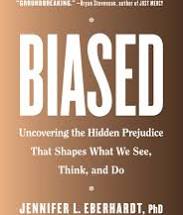What We're Reading Now
Recognizing my Privilege
4 August 2020
Janie read Biased: Uncovering the Hidden Prejudice That Shapes What We See, Think, and Do by Jennifer Eberhardt and considered ways that she can be more aware of her privilege and her own biases going forward.
Tags: diversity, janie read, the next big idea club
The idea that everyone has their own implicit biases—assumptions we make about other races, genders, and cultures without recognizing it —is not a new concept for me, but the extent that these biases can affect all of our thinking surprised me. In Biased, Jennifer Eberhardt demonstrated numerous places where our bias shows up in every aspect of our lives. She included examples from her own life to illustrate why the work she does on implicit bias is so important to her, including several examples that made me think about privilege. She discussed a time when she was arrested with another black friend during a routine traffic stop and how things could have gone very differently if she wasn’t a student at Harvard and happened to have the phone number of one of the Dean’s on hand at the time of the arrest. She was able to use her one phone call to contact the Dean; this connection meant that she and her friend were released on their own recognizance with no need to post bail. The retelling of her experience made me really think about my own privilege growing up as a white girl and how different life is every day for black people.
I remembered an incident when I was a teenager and got in trouble for trespassing after dark at Beaver Creek Park in Crozet. I was at the age when I thought flouting authority was “cool” and didn’t really think about the fact that the park was closed after dark and I shouldn’t be there. I remember sitting on top of a picnic table talking and smoking cigarettes with two white friends when a police car pulled into the parking lot. (Yes, I was also a teenager who thought smoking was the height of coolness.) I remember feeling panic that the police officer was going to tell my parents I was smoking cigarettes. It never occurred to me that we could get into real trouble for trespassing at the park after dark. Remembering the situation now and the panic I felt feels silly because nothing happened to us. The officer called each of our parents. I was grounded and had to listen to a lecture about my stupid behavior, but that was my punishment for fairly typical teenage misbehavior. (It’s also a memory that now makes me and the friends I was with at the time cringe a bit at our idiocy.)

Reflecting on this memory now as the mom of two white boys made me recognize how different experiences are for white teenagers and black teenagers, and the inconsistency between the consequences for the same behaviors. The statistics about black arrests and incarceration rates demonstrate that black people are arrested much more often than white. In the United States, we have the highest incarceration rate in the world. Black people account for only 12% of the U.S. population, but they make up 40% of our prison population. This made me understand how likely it is that things would have been different if we were a group of black kids doing the exact same thing. We were trespassing. What if the police officer who saw us had jumped to a snap conclusion and decided we must be up to no good, instead of recognizing us for the stupid but harmless teenagers we were? If we were black, it is highly likely that we would have been arrested for trespassing instead of being dismissed with a phone call to our parents.
Reading Biased made me recognize that I am safer, and my children are safer every day because of the color of our skin. My black friends with children have completely different worries and concerns for their kids than I do. They need to talk with their kids about things that I do not have to even think about. This is absolutely unacceptable to me. I’m working to educate myself on what I can do to be more aware, and ways I can use my privilege to help others that don’t have the same advantages that I do.







Comments
Our Comment Policy:
Our blog posts are only half of the conversation. What our readers have to say is equally important to us, and we're grateful for all the comments that continue the dialog.
To ensure that the discussion here is as useful as possible to all of our readers, please be respectful of our contributors and refrain from harassing, threatening and/or vulgar language. We reserve the right to screen and remove any comments from the site. If you have a question about a comment or want to discuss our policy, please contact us. We'll talk it over.
There are no comments for this entry yet.